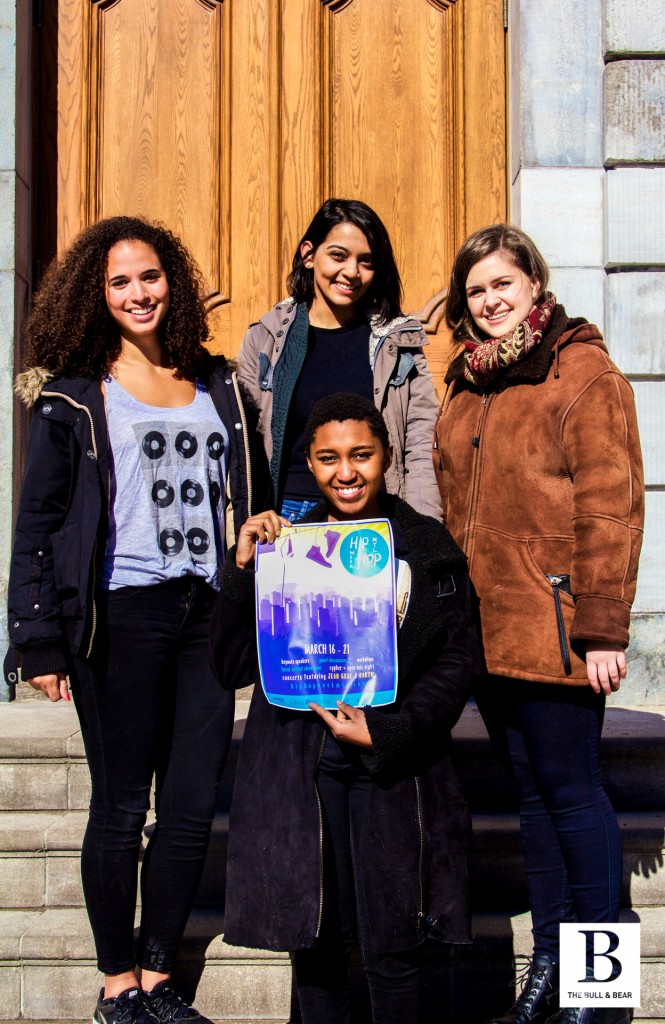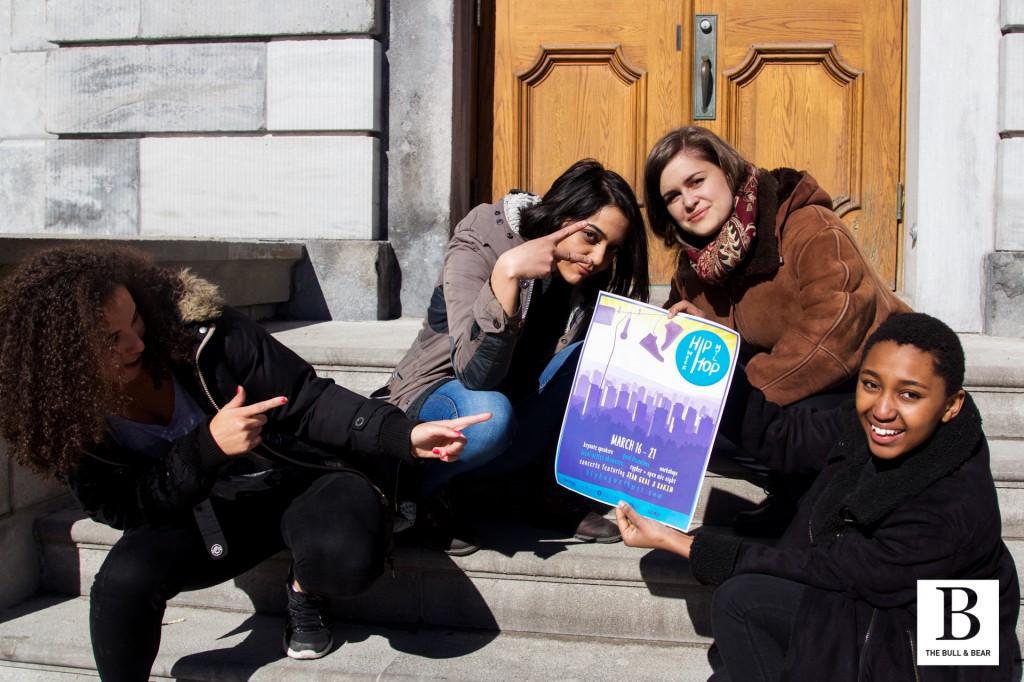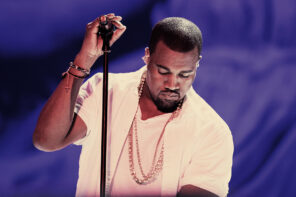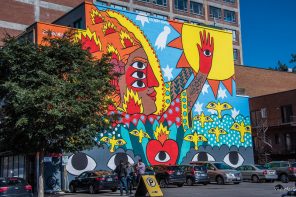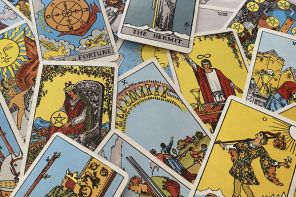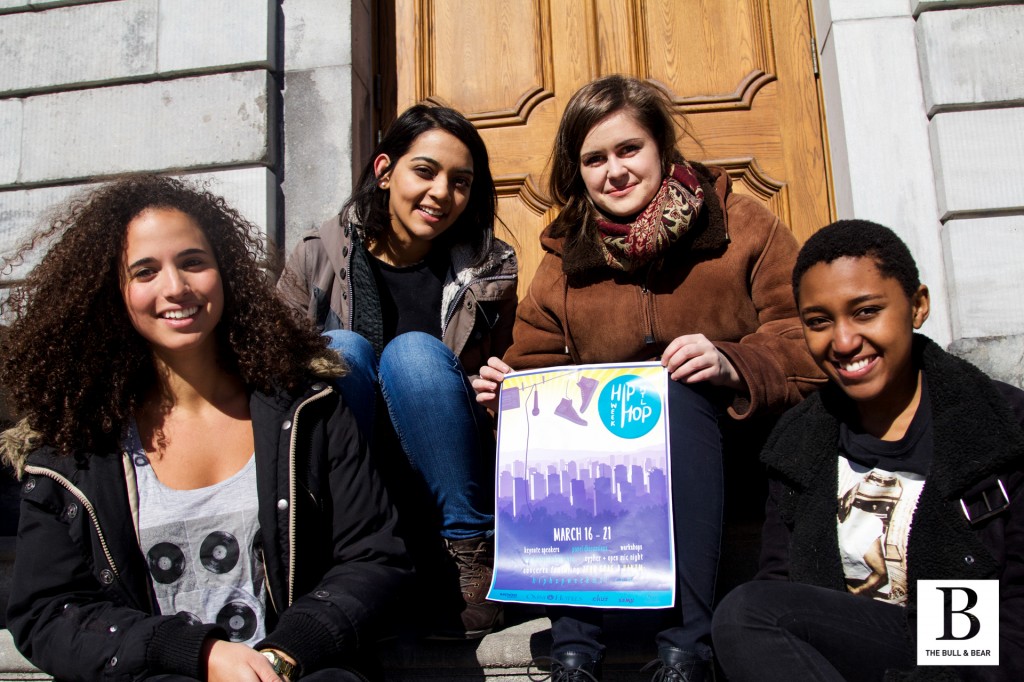
From left to right: Dina El-baradie, Nusra Khan, Katia Fox, and Sta Kuzviwanza (Image courtesy of Matilde Clemetsen)
McGill now has it’s very own Hip Hop Week.
Yes, McGill.
Since this past Sunday, our cherished university has been playing host to a week-long event dedicated entirely to Hip Hop, embracing both its historical aspirations and present-day contradictions. Fully spearheaded by a passionate and devoted group of four women currently studying at McGill – Sta Kuzviwanza, Dina El-baradie, Nusra Khan, and Katia Fox – Hip Hop Week Montreal is much more than just an exploration of a musical genre that has come to be a global cultural force. Rather, it is an in-depth examination of a culture rooted in the historical and ongoing oppression – and resistance – of a marginalized community; it is an earnest appreciation of an art form that has served to educate and unite peoples and social movements across the globe for decades. In truth, it is a love letter to a way of life that is as much a tool for sharing and celebrating the wondrous joys of life through music that moves the body, as it is for escaping and critiquing the unjust horrors of reality through poetry that touches the soul.
As part of our March issue dedicated to student innovation, I recently had the opportunity to interview all four ladies of Hip Hop Week Montreal. Although the setting might not have been the most glamorous – S/O to the ASSA office – our resulting discussion will forever remain one of my absolute favorites, just for the sheer honesty, intelligence and integrity showcased by this brilliant foursome. From the cultural elitism of McGill to the role of gender in Hip Hop to the activist roots of this medium of social change, we explored so many different topics during our ninety minute session that I had no choice but to split the interview into two articles, lest I leave out any of the valuable insights that were shared. The second half of the discussion will be posted in the coming days, and will cover the topics of Hip Hop’s roots in activism, blackness in America, as well as gender in Hip Hop.
While all four of them are currently in their fourth year of studies at McGill, their academic paths are certainly quite divergent: from a major in African Studies to a major in International Management, by way of an Honours in History and a even major in Biology. That said, according to Sta, they uncovered their mutual passion for Hip Hop during the summer of their first year, when they met up at Dina’s apartment for a random, late-night listening session spent swooning over the sentimental flow of Canada’s premiere crooner, Drake. For Dina, this group affinity for Hip Hop was further strengthened through two staples of their early forays into Montreal’s nightlife: parties held at Factory, a now defunct bar that played a wide range of Hip Hop, Rap and R&B, as well as many Friday nights spent at Korova listening to the sounds of DJ Waahli. In Nusra’s opinion, “that’s really just how it started: we just liked dancing to Hip Hop and R&B. Then, we got to know the old-school nineties Hip Hop, and it just grew.” And, according to Katia, their love for Hip Hop has certainly kept growing since: moving from turning up to the more mainstream tracks to fully appreciating the original classics.
**********
B&B: What motivated you guys to start a Hip Hop Week?
STA: The idea came from me, and I brought it up to them. [I explained to them that] as part of the SSMU Equity Committee this year, I have access to resources, we can book a room, and we already know people, so why don’t we?
KATIA: The exciting thing about what motivated us is that we’ve never been to anything like it, and we wanted to go to something like this.
NUSRA: We sat down and talked about what we each wanted to see in the week. We reached out to a bunch of people and they would respond, and they also found us.
STA: In terms of motivation, it was also the [positive] response we got when we [told others] that we wanted to bring a Hip Hop event that’s not just about music, but also about education, community, and celebrating art outside of the club.
According to Sta, it’s through those parties held at Factory and Korova that they were able to meet many of the Hip Hop heads in Montreal’s effervescent community. For her, “the main context of knowing a lot of these people was that’d we’d meet up and we’d all have a good time. At the end of the night, we’d hug each other and [part ways until the following week].” Ultimately, the relationships they developed with these music lovers only ever occurred through these weekly, fleeting interactions at night. Then, they realized, “We actually want to do an event and get to know these people outside of them just being artists, because they have a lot of interesting things to say. Once we got that really positive initial response from these people, [it became obvious] there really is a demand and a need for this type of [event] in the community and educational sphere.”
In terms of McGill specifically, Nusra believes that what they found was a “huge interest in it and that people are very willing [to attend such an event] because they like the idea. But, what really propelled some of the people we got on board for funding, like the Department of Education, was that this hasn’t happened at McGill, and that’s exclusively a McGill problem.”
B&B: Why do you think it’s taken so long for McGill to hold such an event? After all, McGill touts all the time that it’s the most international school in Canada, and that it’s located in Montreal, which is one its most culturally diverse cities. So, why has it taken so long for actual concrete actions, in terms of demonstrating the cultural diversity of McGill, to come to the foreground? It’s so much to say that the students come from tons of different countries, but when there’s nothing to actually represent those diverse interests, it’s takes more than just having those students here.
STA: Part of my big thing with this is that, when I was starting my job as Equity Commissioner at the beginning of the year, there were these types of events that were done by private parties or groups on campus [for example, the MUS Twerk Circus party, and other types of “ratchet”-themed nights], and there was a lot of conversation happening about cultural appropriation. What I realized from a lot of students in the McGill population is that a lot of them are bumping Rap music and Hip Hop, and they’ll tell you that they’re Hip Hop/Rap heads. But, when you really ask them “What do you know about Hip Hop or Rap?”, “Do you think there’s such a thing as cultural appropriation?”, “Do you know about the class and racial implications of Hip Hop?”, there’s a complete blank. So, for me, coming from an equity perspective, I had to think about that [because] there did come a point when I realized there is clearly something weird going on.
NUSRA: In terms of McGill’s own representation issues, when we were trying to find funding, we found that there’s nothing really in place for arts or initiatives coming out of marginalized communities or that are exploring issues of a certain class. For somebody trying to organize an event [like this], it takes literally twice the effort because you don’t have a fund that you can just tap into. In terms equity and Hip Hop culture, I don’t even think it’s so much an issue about Hip Hop heads not knowing the history of Hip Hop per se. But, recently in popular culture, we’ve seen major events [and individuals like Iggy Azalea and Eminem] that bring this conversation to the foreground. And, to see the response to that in popular media has been really…
B&B: You mean, the ignorance in the response?
NUSRA: Yeah, that! It’s been really difficult, because its easier to live your life not expecting this kind of opinion to come out of somebody; you assume it must not be [as much] an issue in their life as it is for me. But, what I found is that people are actively against and opposed to seeing people of colour (PoC) and people of certain classes, and just acknowledging where Hip Hop and certain art forms originate.
DINA: From a community engagement perspective, in addition to the equity issue, I find that, at McGill, it’s very traditional and elitist, [especially bearing in mind] that you have courses taught on Hip Hop at Concordia. When we spoke to the Music Department, they were just blank.
STA: They were like, “We have a Jazz department!”
DINA: And they have classical music, so it’s very much traditional, old-school and elitist. In the community at McGill, everyone has heard of the McGill bubble, and a lot of people live in it. For me, as the [SSMU] Community Engagement Commissioner this year, I also wanted to do something that pushed McGill students to engage with the wider Montreal community. So, when Sta brought up the idea, I thought, “This is perfect.” It can fit in my portfolio because so many of even my friends at McGill don’t leave McGill, they don’t leave their circle of friends here, they don’t know the crazy art that exists [in Montreal]. I’ve just been lucky to know it because [the four of us] discovered it together.
NUSRA: It’s funny because, as a university, McGill touts Montreal’s art scene and culture [as one its selling points], and then, you have [the reality] of it being closed off.
KATIA: But, it all comes back to McGill being a business, and who is funding McGill and giving them money, right?
B&B: What do you mean by that?
KATIA: [laughs] Not to be controversial, but I’m part of a program that teaches piano to kids. We have zero problem getting funding. We have a lot of funding because it’s a classical art, and it’s seen as a classical way of teaching music and involving people in music. Whereas for Hip Hop, these funders, who might be older or from a more elite background, don’t see Hip Hop as a mode of education or as a form of true art. So, that’s not going to get funded, and there’s no reason for McGill to support that if there’s not going to be an outcome from it.
NUSRA: That just leads to this weird, almost polarization of how Hip Hop and other non-classical art forms are treated at McGill, [where they’re] not supported at all at the institutional, higher level. Events-wise, on every event planning committee I’ve ever been part of, [they already] cater to a certain group that has a certain amount of capital and can come out to that event. So [on campus], there’s nothing in between, no room to bridge that divide between the really shallow coverage of popular culture and media on Hip Hop and what it actually means.
B&B: So then, what role do you hope the event will play in giving students, specifically Black students and students from other marginalized communities, a space to actually enjoy Hip Hop and also just find themselves together. I think that’s something that’s definitely lacking at McGill in general. Despite the fact that we do have cultural groups and services like the Black Students’ Network (BSN) that offer these opportunities for students to come together in a “safe space,” so to speak, how do you hope this event will also contribute to that?
DINA: While the BSN this year has been amazing and all their events have been super great, when there’s, for example, a social event [like its Fro-Back party last February playing exclusively old-school Hip Hop and R&B], it’s very much catered to that crowd. So, only people who are interested in Black culture and that kind of music will go to that. But, we’re bringing [Hip Hop Week] here. We’re bringing it to campus, and it’s more than just a panel discussion that people would go see if they’re super interested in the topic. It’s several events of dynamic nature, so people are going to see it – whether or not they’re involved in it.
STA: [On the topic of safe space], for us, with this event, we’re literally breaking into the space at McGill [and] occupying space. Particularly for marginalized, Brown and Black bodies, it’s very important for us to be visible and specifically choose to occupy spaces that weren’t built for us. A lot of the people from the Hip Hop community that we’re inviting don’t usually come anywhere on McGill campus. And, they’re all of a sudden now having a real reason to come into this institution.
B&B: You guys are giving them a space.
STA: We’re opening the doors to them, and [we’re saying], “This event is for you. You have the right to come to this space and sit in the middle of Leacock because, even though you don’t [necessarily] have a degree and don’t [formally] have access to this space, this space is for you.” I think that in and of itself is so important, because McGill does not give that type of impression when you look up to it.
KATIA: For an institution that has very few PoC teaching or in high-up positions, bringing in all these scholars and artists that look like [these artists from the local community] and that listen to their music, gives them representation.
NUSRA: Even the speakers that we’re bringing in, there’s no similar branch of that at McGill. For example, when we were trying to find people to sit on a panel with [the respected Black academic and Hip Hop historian, Dr. Jeffrey OG] Ogbar, it’s difficult because [at McGill] there’s nobody who does Hip Hop history or the cultural history of Black Americans. It’s just not there, it doesn’t exist.
B&B: So, within the McGill community, has there been interest in actually attending this event, which – I’m sad to say – is so out of the ordinary for McGill?
DINA: Yeah, I would say yes. I mean, I have a lot of friends who I discovered were Hip Hop heads because of this event. Even from people who are not necessarily super into Hip Hop, just the idea of it – because it’s foreign to them – is intriguing.
B&B: From what I’ve seen, I think there’s a lot of interest from the local community precisely because we’re in Montreal and the Hip Hop scene here is so thriving.
NUSRA: Yeah, Montreal has such a vibrant Hip Hop community, and it’s so sad to see how foreign it is to McGill kids. Like Dina mentioned earlier, Concordia has courses [on Hip Hop] taught by the same members [of the Hip Hop community], but with McGill kids it’s just not there – in terms of events that are happening locally, at smaller-venue concerts or at smaller festivals.
STA: But even if [those Hip Hop lovers] are there, like Dina was saying, it’s just so subversive: it’s not something that comes up in casual conversation. [Hip Hop] is not something that’s in the dominant culture or the dominant dialogue on campus. So, if there are Hip Hop kids out there, we’d love to meet them!
B&B: So, like a call to Hip Hop heads?
STA: Yes, a call to Hip Hop heads!
KATIA: It’s also a great opportunity for a lot of McGill students for whom Hip Hop starts and ends with “Coco,” [the cocaine-glorifying, club banger by O.T. Genasis].
NUSRA: And Iggy Azalea!
KATIA: For a lot of people, they say “I love Hip Hop,” but that’s all they know. So, if they’re interested in Hip Hop, it’s a great learning opportunity. It’s a great opportunity to figure out what the history is and what the culture actually is.
B&B: Can you talk to us more about the Hip Hop community in Montreal?
NUSRA: It’s really cool because you see the same people at all the local events, and they work really hard to host their own things. Then, you meet people who are just becoming a part of that circle and, once they see that there’s a little system to it, it’s even more exciting. I don’t know how long this system has been around of people just working together and helping each other out. It seems like something that’s really young, fresh and exciting to me because I’m just learning about and seeing it now. And, it’s popping up everywhere once we start looking for it.
DINA: It’s mindblowing the amount of talent in Montreal. You see people and you’re like, “How are you not bigger than Beyoncé?” Like Meryem Seci, she should be bigger than Beyoncé: she’s incredibly talented! She’s part of [the multicultural artist collective] Nomadic Massive, and her voice is amazing. She raps in English, Arabic and French, and she has a sick flow in all three languages.
KATIA: I think a part of being a real artist is that it’s not just about making a quick buck or making a quick single. For these people, it’s their life, it’s their passion, it’s their community, it’s everything for them. So, I think that’s where these amazing artists come from out of Montreal; it’s because there is that fostering community. There’s so much support. All of these people go to teach other’s shows, they collaborate together. Everyone really wants to build each other up as a group, as a community.
**********
After having interviewed these four ladies, I realized that a big part of Hip Hop Week is about contributing and giving back to the local community by showcasing the talent that we already have in Montreal. I’m always amazed by just how much is going in Montreal, and how much talent people have. So, personally I agree that we need more platforms to showcase that. Especially at McGill, the fact that this is the first time such an event happening, it just goes to show how needed Hip Hop Week really is.
Hip Hop Week Montreal continues today and tomorrow. On Friday, Dr. Awad Ibrahim will be leading a discussion on Hip Hop linguistics, the N-Word and the accessibility of Rap. The famed femcee, Jean Grae, will also be offering a talk, which will be capped off by a performance at Le Belmont. On Saturday, Rakim, one of the most prolific rappers of all time, will be speaking in Leacock 132, and will be closing off the week-long event with a show at Le Belmont, joined by Gabe ‘Nandez and Nomadic Massive.
As a not-for-profit organization, all profits from Hip Hop Week Montreal will be donated to the No Bad Sound studio, which offers Montreal youth a space to develop their musical talent and express themselves artistically through workshops, as well as recording and performance opportunities.
For more information on Hip Hop Week Montreal, check out their website here. You can find the schedule for the remaining events here.

